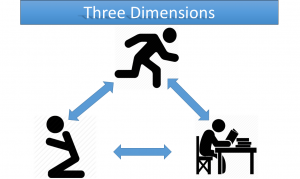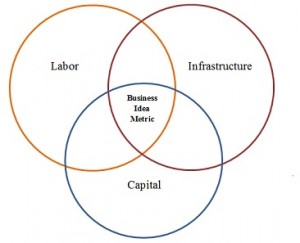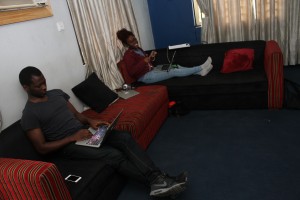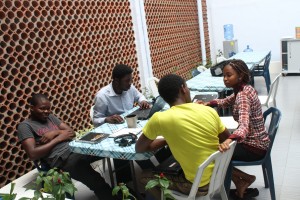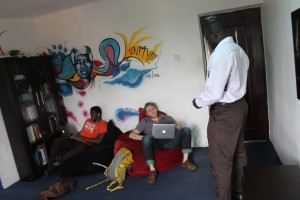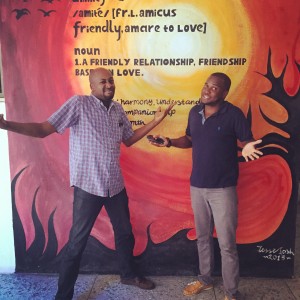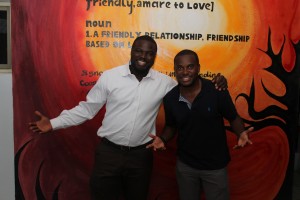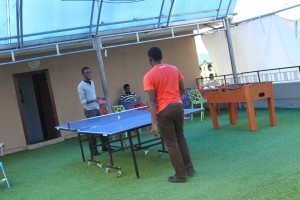I’m excited to launch the “Find Insights Via Engaging™ (F.I.V.E) Questions with an Executive” series. This will complement the F.I.V.E Questions with an Entrepreneur series. Same as the original series, it will feature answers to five unique questions posed to an Executive. Their answers will enable every reader to learn how they advanced in their career, discover how they honed their unfair advantage, and gain from any piece of actionable advice that has continued to deliver dividends. It will be fun, insightful, and inspiring. The goal is that you are able to take away an actionable insight that you can apply to your career, business, or venture and get immediate results.
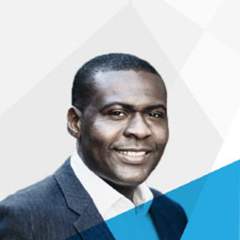
To launch this new series, I’m excited to introduce you to John Aisien. John is an experienced and result-oriented technology executive, with a track record of leading go-to-market functions or entities within high-growth software businesses. I connected with John a few years ago while I was at Oracle. At the time, John was a VP of Product Management for Oracle Fusion Middleware. After many successful years at Oracle, John left in 2014 to join Mocana, a venture-backed San Francisco based company with a focus on embedded systems & app security, as their President and COO. John is now the CEO of Blue Cedar Networks, which was spun out of Mocana in March 2016.
John’s trajectory is impressive. He continues to rise despite the numerous headlines about the lack of African Americans in leadership positions at tech companies in Silicon Valley. To put this into perspective, a USA Today article in 2014 reported that leading technology companies based in Silicon Valley vastly under-employ African Americans and Hispanics. These groups make up 5% of the companies’ workforce, compared to 14% nationally. The figures are even more alarming when you consider the even smaller percentage of African Americans in leadership positions. Those that achieve this milestone are often seen as superhuman. So it wasn’t a surprise last year when we were all intrigued by the public exit of the only black Twitter engineer in a leadership position. I remember thumbing frantically through my timeline to follow the discussion. #DiversityIsGoodForBusiness
This conversation with John is designed to provide actionable insights; it’s also designed to celebrate him as he paves the way and sets a great example of the art of the possible.
1. Provide a brief overview of what you do. What are some of the most exciting aspects of your role?
I am Co-Founder & CEO of Blue Cedar Networks. We are a new company, a new legal entity, but we are running a long standing business, because Blue Cedar is a spinout from an existing venture funded company called Mocana. For two years, I was essentially running the business that eventually spun out of Mocana into Blue Cedar. I originally became aware of the Mocana opportunity through a mentor and former boss, with whom I had long-standing personal & professional ties. We had worked closely with each other in the past and we successfully built and sold an enterprise security company to Oracle, during the middle part of the last decade. What excites me about what I’m doing right now? Well, three big things. One is the opportunity to not only sell into a market but help to also create that market and then sell into it. That to me is unique and exciting. Market creators generally generate unique returns and experiences. Two, it’s an opportunity at this stage of my career to work with a group of people that I have effectively cherry picked, because we spun out of Mocana together and I hired a good number of them. This brings a tremendous amount of trust and longstanding history between us. One of them & I actually co-wrote a blog about this. The third thing that excites me about what I am doing is that for the first time in my career, I own the ultimate responsibility for generating enterprise value for a company. I’ve been in leadership roles in small and large companies for over 16 years, but this is the first time that as the leader of a company, I’m ultimately responsible for creating enterprise value for the company. So, that’s exciting, and brings with it uniquely different dimensions of responsibility, compared to my previous experiences. One specific example is the experience of running a Board of Directors, with savvy & highly experienced board members.
2. Flash back and then fast forward to the present. What has surprised you the most about advancing in your career and what advice do you have for others looking to take a similar path?
Generally, I’ve been pleasantly surprised by the degree of willingness that the vast majority of people have to help. Seriously, you read stories about office political machinations and people not always having one’s best interests at heart. Conventional wisdom creates an image of a very cutthroat, unforgiving corporate world. To be clear, I’m a realist and suspect that there could be some truth in this. And it’s highly likely that I’ve been an oblivious recipient of such bad experiences. But what I have consciously experienced is that the number of times I’ve asked for help from investors (even those who are not investing in my company), from customers, from partners, even sometimes from competitors, and others, and have received that help, has been way greater than my expectations, or conventional wisdom. I would say my biggest takeaway is – ask a lot more regularly than perhaps logic will suggest, because in more cases than not, you are likely to get a positive response from your ask. In terms of advice, I’ve focused on things I know I do well and I’ve been very honest and dispassionate about things I know I don’t do so well. And I’ve optimized my execution towards the things I do well because it has allowed me to stand out in every role I’ve had. Reflecting on it all, I would say that this is the positive side of the ledger, and is perhaps something I wish I had done a bit more quickly in my career. Looking back though, I think I could have achieved this milestone that I have achieved now if I had simply asked for or created the opportunity a bit earlier. I don’t feel ten times more ready today than I was ten years ago. So my recommendation for anybody looking to tread a similar path is – when you get the sense that you’re close to being reasonably ready, you probably are. And then at that point all you have to do is ask, or create the opportunity for yourself.
3. What is your unfair advantage and what would your colleagues or clients say are the main reasons that make working with you rewarding?
I’ve actually thought about this a lot. One has to be dispassionate about answering a question like this. My unfair advantage is probably not what I would prefer it to be. I like to regard myself as a deep intellectual thinker who really understands in very great detail whatever topic or concept I’m required to understand. I still think that there is some truth in this, but others perceive me as primarily a very good communicator, both in written and in verbal form. This is the dimension across which most people would rank me higher than the mean. So it may not be how I would like to see myself, but it’s how others see me. I’ve learned to accept this over time and play towards this unfair advantage. As an example, over the course of the last three months, one of the big things we had to do to spin out and create this new business was intensively reach out, communicate with, and secure commitments from the entity’s founding investors. For this exercise, I played the role of primary communicator, but accepted that there was somebody better than me at representing the underlying concepts behind our technology. So I made sure I paired myself up with our CTO, Kevin Fox, and this combination ended up being way more powerful than me by myself, or my CTO by himself. So the takeaways are: understand your unfair advantage, accept this unfair advantage, and complement yourself with others who have other unfair advantages, to enable you to achieve your objectives.
4. Reflect on all of the key sacrifices and trade-offs you’ve had to make to get to where you are today. Which of these would you say was the most pivotal and why?
There are actually many that as I reflect fall under this category but if I had to select one, I would say it’s the number of times I’ve physically moved in my life, and specifically, in my career. Since 1991, I’ve moved 11 times. Nine of these times with my wife. I moved from the UK to Nigeria as a kid, and then back to the UK, and so on. Don’t worry, I don’t plan to go through all 11 moves in detail! I would say this, each of these moves have been increasingly difficult, particularly as one has gotten older and as one’s family has expanded in size and scope. The last move in particular from the UK to Silicon Valley five years ago obviously ended up being pivotal. If you want to achieve your potential as a baseball player, you want to play in the major leagues. If you want to achieve your potential as a chess player, you want to become a grandmaster. And ultimately for me, having a big objective and aspiration to become a leading technology executive, the best place to flex these muscles and achieve the art of the possible is in the Bay Area, here in Silicon Valley. So the number of times I’ve moved has been a burden on my personal life, but without these moves, it would have been difficult to achieve all that I have to this day. I’m in awe of the depth of family support I’ve enjoyed, and continue to enjoy.
5. What is the best piece of actionable advice that you’ve received that continues to be source of inspiration and further development?
It’s really difficult to select one so I’m going to cheat a bit and maybe select a couple.
A partner of mine at Blue Cedar told me this:
“Every day, you have to feed all three dimensions – physical, intellectual, and spiritual, of yourself as a human being.”
This may sound a bit metaphysical, but I practice this daily and it really works. Every day, you have to feed your physical dimension through some form of exercise. You also have to feed your intellectual dimension by acquiring some net new knowledge that you otherwise didn’t have, or enhance existing knowledge that you did have. Lastly, you have to feed your spiritual dimension. And this doesn’t mean some form of organized religion. It may not even mean religion. So every day I look back on what I’ve done and use these three axes as a compass to judge whether I’m living a balanced life and I can categorically say for me at least, it works. I always find some deficiency across one of these axes, daily, and this daily calendar entry serves as a compass to help me get conscious about the deficiency, and correct it before I go to bed.
Another actionable piece of advice is from my father, a man full of African wisdom. I come from Benin, Edo State (Benin City is capital of Edo State in southern Nigeria). The Benin people have this strong ethos towards the nurturing and establishment of self-confidence. And I’ve begun to practice this a lot more in my life. I’ve been a recipient of this gift from my parents. And now I’m beginning to impart this to my kids, as I’m increasingly aware of its impact on my life. I would say in summary, of all the innate attributes that one can have, I believe one of the most valuable long term is self-confidence. If you’re aware of this and you proactively nurture your self-confidence to maximize its benefits, while ensuring that it doesn’t spill over into conceit or unnecessary bravado, I think you maximize your chances of achieving the most in your personal and professional life.
“A focus on self-confidence, particularly in a crazy world where values evolve very quickly, is a very good way to maximize one’s own inherent value and the value of those around you that you love.”
John Aisien Biography
John graduated with a B.S. in Mechanical and Electrical Engineering from the University of Benin, Nigeria. He is a chartered member of the UK Institution of Mechanical Engineers, Early in his professional career, he performed a wide range of management training, strategy and IT consulting roles across numerous firms in the UK, including British Aerospace, Anglia Trains, Gemini Consulting and others. He then went on to earn his MBA, with a focus on Finance and Entrepreneurship, from Stern School of Business at New York University. Post Business School, he joined Thor Technologies, which ultimately became a leading enterprise identity and security management software company. At Thor, he ran marketing, product management, business development and strategic partnerships. He led Thor’s re-branding and market positioning efforts. Thor was acquired by Oracle in 2005. After 8 years at Oracle, John joined Mocana, eventually rising to the role of President and COO. He is now the Co-Founder & CEO of Blue Cedar Networks, which spun out from Mocana in March this year.
When John is not leading board meetings and running business operations for Blue Cedar, he is reading for pleasure, or leading the offense for his coed, over 40s soccer team. He is married with two children.
Blue Cedar Network is active on social media. Connect with them on:
- Twitter: @BlueCedarNet
- LinkedIn: Blue Cedar Network

